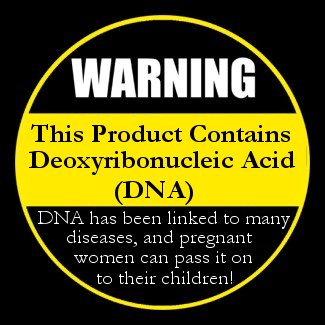
Well, I recently came across a survey that might help me understand why the opinion of the majority means little to me. It was done by the Oklahoma State University Department of Agricultural Economics. This particular survey is performed online monthly and tries to track “consumer preferences and sentiments on the safety, quality, and price of food at home and away from home with particular focus on meat demand.” Even though most of the questions on the survey are consistent from month-to-month, ad hoc questions can be added.
For the June 2016 survey, three new ad hoc questions were added. One of them asked the respondents whether they support or oppose a mandatory label on all foods containing DNA. It turns out that 80% of the respondents supported the idea! By contrast, 82% supported mandatory labels on foods produced with genetic engineering, and only 69% supported mandatory calorie labels on restaurant foods.
Now, of course, I suspect that most of my readers are educated enough to understand how silly it is to want mandatory labels on foods that contain DNA. However, just in case it escapes some people: Most of the food we eat contains DNA! When you eat a vegetable, for example, you are eating plant tissues that are made up of plant cells. Each and every cell holds the plant’s DNA in its nucleus. When you eat meat, you are eating an animal’s muscles, which are composed of muscle cells. Once again, muscle cells contain the animal’s DNA. It is very difficult to eat without ingesting the DNA of the organism you are eating!
Think about that for a moment. In this survey, 82% of people think there should be a warning label on foods that were produced with genetic engineering. However, the majority of those people also think there should be a warning about something that is in nearly every food we eat! Why in the world should we take advice about genetically-modified food from people who clearly don’t know much about the very molecule that is modified to make those foods? Also, since there were fewer people who supported mandatory calorie labels on restaurant foods, at least some of the people who are worried about DNA being in food don’t seem to be worried about how restaurant food can contribute to a real health issue: obesity!
This survey tells me two things: First, science education in the U.S. is abysmal. Of course, there are lots of other things that have already demonstrated that! Second, we shouldn’t listen to surveys when it comes to making decisions.

Dr. Jay, I think I may know why most people responded that way. Perhaps these responders were thinking of foreign DNA in the sense of genetic engineering. Sadly, they may not have even realized their error. Many people are concerned about DNA of aborted babies or other organisms in vaccines (yes, I know you have written about this) and certainly, many Americans are concerned about genetically modified foods and their effect on our bodies. This is especially true when plants are modified to resist a particular chemical such as Roundup.
I find that often surveys only allow for a yes or no, rate 1-10, or something of that nature. If the question is not clear or if your answer does not fit, you must answer anyway to go forward. To me this skews the survey. I do not know if this particular survey was like this, but I mention it as a possible factor.
Thanks for that suggestion, Darlene. I hope it explains at least some of those who responded that way.
They simply thought dna was a bad thing. Most don’t have a memory of dna as our essence.
Science education has never been better in N america. when was it better if this is not right??
its not science but simply memorizing endless data. All people know the data they care about.
lets remember N americans are the most intelligent people in human history. this because of the true faith being most accepted and having most impact here. Evangelical Christianity.
Most science accomplishments have come from N America in the last century.
Thats why creationism /rejection of evolution is highest here.
Just as it would be with a smarter people where wrong ideas are kicking about. A curve on the graph.
Very interesting post Dr. Jay! 🙂
Abysmal is just the word. I shouldn’t be surprised any more, but the . . . umm, “poor thinking habits” of so many people continues to do so. Thanks, Dr. Jay, for doing your part to combat the epidemic of young (and old) “skulls full of mush” out there!
Reminds me of the famous petitions to ban dihydrogen monoxide, which is, of course, responsible for thousands of deaths each year due to inhalation, traffic accidents when in its solid form, burns in its vapor form, etc. 😉
At one of the labs I worked in, we had trouble with people stealing our distilled water, which was held in a large jug labeled “distilled water.” When I labeled it “99.9% pure hydronium hydroxide” (another perfectly valid name for water), people stopped stealing it!